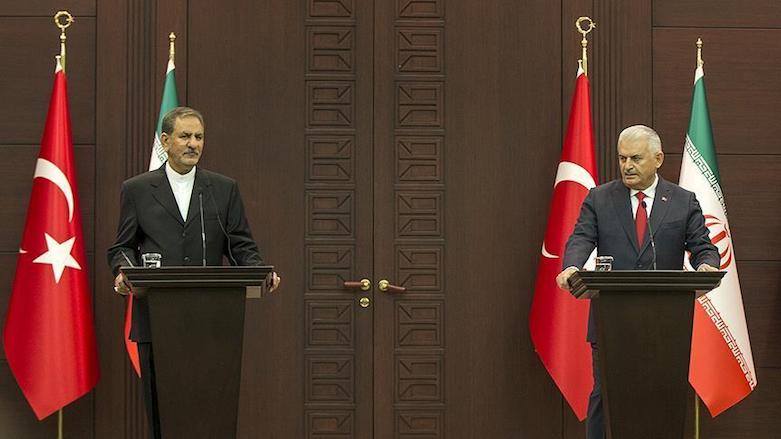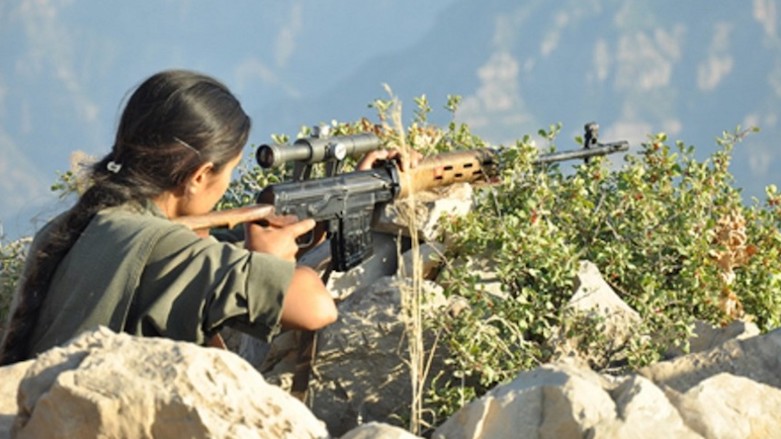Iranian VP, Turkey PM vow joint action against Kurds

ERBIL, Kurdistan Region (Kurdistan 24) - Iran and Turkey on Thursday sat down in Ankara to explore means of joint action against Kurdish rebels both countries are fighting.
The meeting of Iran's Vice President Eshaq Jahangiri and Turkish Prime Minister Binali Yildirim is the latest in a series of trips between the political and military heads of the two states in the last several months, both opposing Kurdistan Region's independence.
In a joint press conference with Jahangiri, Yildirim said he valued close cooperation with Iran in his government forces' fight against the Kurdistan Workers' Party (PKK), a group seeking larger Kurdish rights in both countries.
PKK along other armed Kurdish groups including its Iranian offshoot Kurdistan Free Life Party (PJAK) as well as Democratic Party of Iranian Kurdistan (PDKI) and Komala Party of Iranian Kurdistan are based in Kurdistan Region's Qandil mountains that straddle along Iran-Iraq border.
Yildirim's remarks were reminiscent of an earlier statement by the Turkish President Recep Tayyip Erdogan who in August hosted the Iranian Chief of General Staff Mohammad Baqeri.
The Turkish PM and Iranian VP reiterated their shared rejection of Kurdistan Region's last month referendum on independence from Iraq.
"We see the involvement of countries outside the region. We believe that part of these tensions is the result of Israeli actions and plots," Jahangiri said, once again tying Kurdish century-old aspirations to the Jewish state.
Jahangiri blamed the September 25 referendum approved by 92.7 percent of Kurdistan's people on "Israeli agents."
Ankara and Tehran were also opposed to the disintegration of Syria, disapproving US-backed Kurdish groups' plans for autonomy, reported Turkish state media.
"We need to protect the idea of a strong region so that the United States and the Zionist regime cannot plunder in this region," Jahangiri said.
Turkey supported the Iranian-backed Iraqi army and sectarian Hashd al-Shaabi offensive earlier this week that swiftly captured the Kurdish-majority city of Kirkuk and other disputed areas due to a breach in Kurdistan Peshmerga forces' defense lines.
"The two countries of Turkey and Iran can resolve regional issues and crises on their own and without the presence of foreign countries, given the long history and culture," Jahangiri added.
Erdogan and his Iranian counterpart Hassan Rouhani also in a Tehran meeting earlier this month claimed Kurdistan's bid for statehood was merely a Jewish plot, stoking anti-Semitic sentiments widespread in their voter bases.
Although rivals in their regional foreign policies, both the Islamic Republic of Iran, the primary sponsor of Shiite sect of Islam and Turkey, constitutionally secular but increasingly pro-Sunni, share similar views regarding demands for federalism by Kurds within their borders, and those backed by the US in Iraq and Syria.
The NATO member Turkey, home to over 20 million Kurds, and Iran with an estimated 10 million Kurds, recently agreed on building a 144 kilometers long (90 miles) wall along their porous border to deny PKK fighters freedom of movement.
That border last saw a change for the first time in over 400 years when the two nations exchanged a small chunk of territory at the beginning of the 1930s to help a young Turkish state crush the short-lived Republic of Ararat declared by the Kurds.
Editing by Ava Homa

